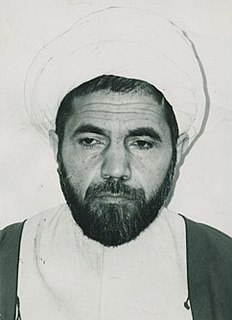
Ayatollah Taqi Mesbah, commonly known as Mohammad-Taqi Mesbah-Yazdi was an Iranian Shi'i cleric, philosopher and conservative political theorist who served as the spiritual leader of the Front of Islamic Revolution Stability.

Ayatollah Mohammad Mofatteh was an Iranian philosopher, theologian, and political activist, born in Famenin, Hamadan, Iran. After he finished his primary education in Hamadan, he left for the Islamic Seminary in Qom, where he was taught by reputable teachers such as Ayatollah Muhammad Hujjat Kuh-Kamari, Ayatollah Sayyed Hossein Tabatabei Borujerdi, Grand Ayatollah Sayyid Ruhollah Mūsavi Khomeini, Ayatollah Mohammad-Reza Golpaygani, Ayatollah Marashi, and Allameh Tabatabie. He continued his studies at seminary and at the same time studied philosophy at Tehran University, where he earned his PhD and became a professor and a dean of colleague.

Mazandaran University of Medical Sciences is a medical university in Sari, Mazandaran province, Iran. It is one of the top medical universities in Iran.

Lotfollah Safi Golpaygani was an Iranian Grand Ayatollah. He was at one point the most senior Twelver Shia scholar (Marja') in Iran until his death. He resided in Qom and taught Islam in the Qom Seminary.
Khomeinism refers to the religious and political ideas of the leader of the Iranian Revolution, Ruhollah Khomeini. Khomeinism also refers to the ruling clerical class of Iran after 1979. It can also be used to refer to the radicalization of segments of Shia populations of Iran, Iraq, and Lebanon, and the recruitment by the Iranian government of Shia minorities in Afghanistan, Saudi Arabia, and Africa. The word Khomeinist and Khomeinists, derived from Khomeinism, are also used to describe members of Iran's clerical rulers and differentiate them from regular Shia Muslim clerics.
Imam Khomieni Memorial Trust, Kargil - Ladakh is a socio-religious organisation in Kargil, Ladakh, India. It was founded in the year 1979 by a group of young volunteers. The Iranian Revolution was the basic reason for formation of the Trust. The sole aim of the trust is to keep the principles and values set by Ayatollah Khomeini alive and particularly his last will emphasizing the unity of Muslim Umah and helping the cause of oppressed and downtrodden people of the world.
The family of Imam-Khomeini, also transliterated as Khomeyni, is an Iranian religious Shia family that migrated from Nishapur, to Awadh in the 18th-century, and then finally settling in Khomeyn in the early 19th-century. They claim descent from the seventh Shiite Imam, Musa al-Kadhim, and hence are a Musawi family.
Partow-e Sokhan is a Persian language weekly newspaper published by the Imam Khomeini Educational Research Institute in Qom.

The Shah Mosque, also known as the Soltāni Mosque meaning "royal", renamed the Imam Mosque, after the 1979 Iranian Revolution, is a principal mosque in the northern section of the Grand Bazaar in Tehran, Iran.

Alef-Laam Khomeini is a book written by Hedayatollah Behboudi, which is regarding the biography of Iran's 1st/former supreme leader, Seyyed Ruhollah Khomeini. This book was published by the institute of "Motale'at wa Pazhuheshhaye Siasi" in 2018; and has obtained Jalal Al-e Ahmad Literary Award, and also Iran's Book of the Year Awards.
Abdolmohammad Ayati was an Iranian author, translator and researcher in the field of philosophy, history and Persian and Arabic literature. He was born on 5 May 1926 in Borujerd, Borujerd County, Lorestan Province, Iran and died on 11 September 2013 in Tehran, Iran. He was selected at the second Iran's Book of the Year Awards for Arabic to Persian translation of the book History of Arabic Language Literature.

Reza Mohammadi Langroudi was an Iranian Twelver Shi'a cleric of the rank of Ayatollah. He served as representative of the Iranian Supreme Leader Ali Khamenei in the town of Langroud.

Seyed Kazem Noor Mofidi is a Supreme Leader's representative in Golestan Province, The leader of congregational Friday prayers of Gorgan, and is a member of the Assembly of Experts in Iran. He is considered the oldest Friday prayer leader in the country and the only representative of the reformist Supreme Leader in Iran.

Zakaria ibn Adam Ash'ari Qomi was a Shia Muhaddith from 8th century and one of the companions of Jaʿfar ibn Muḥammad aṣ-Ṣādiq. He was one of the narrators of Musa ibn Ja'far al-Kadhim and the agent of Ali ibn Musa al-Ridha and Muhammad al-Jawad in Qom, Iran.

The policy of exporting the Islamic Revolution is a strategy in Iran's foreign policy that believes in exporting the teachings of the Iranian Revolution of 1979 to achieve similar examples in Islamic and even non-Islamic countries. This policy has been explicitly and at various times announced by Ruhollah Khomeini, the founder of the Islamic Republic of Iran. One of the basic slogans of the Islamic Revolution of Iran, which has won based on religious ideology, is the export of the revolution. Accordingly, the purpose is exporting the revolution as a culture, ideology and an intellectual and epistemological method.

Seyyed Abdollah Fateminia is an Iranian Shiite cleric, professor of Islamic ethics, orator, Islamic historian and bibliographer. He researches Arabic poetry, hadith, ethics and mysticism. His religious sermons are often broadcast on Iranian television, so he is a well-known religious figure in Iran.

Mirza Jawad Agha Maleki Tabrizi or Mirza Jawad Maleki Tabrizi was a scholar of Islamic jurisprudence, principles, ethics, wisdom and Islamic mysticism.

Seyed Ayatollah Karamatollah Malek-Hosseini was an Iranian Ayatollah and member of the Second, Third and Fourth terms of the Assembly of Experts.

Seyed Abdol Javad Alamolhoda was an Iranian Ayatollah. He is the older brother of Ahmad Alamolhoda, the Friday prayer leader in Mashhad. He was also the founder of Al-Qaim Seminary in Tehran.

Sheikh Hadi Rohani Persian: شیخ حادی روحانی, was an Iranian Ayatollah. He represented the Supreme Leader of Iran for Mazandaran Province, as well as being the Friday Prayer Leader for Mazandaran. He also represented the people in Mazandaran for the first, second and third terms of the Assembly of Experts.